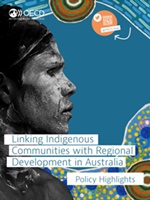Australia

Linking Indigenous Communities with Regional Development in Australia
There are approximately 800,000 Indigenous Australians, which is 3.3% of Australia’s
total population. Indigenous Australians are custodians of the world’s oldest living
continuous culture and make a vital contribution to contemporary Australian society.
Indigenous Australians are also important for the future of the national economy.
For example, the amount of land with Indigenous ownership and interest has increased
significantly in the last 50 years and now covers approximately half of Australia’s
land mass. Indigenous Australians play an important role in the development of regional
economies. Compared to the non-Indigenous population, Indigenous peoples are more
likely to be located in predominantly rural regions. However, significant gaps in
socio-economic outcomes with non-Indigenous Australians remain and these gaps are
larger in rural regions. The report provides three key recommendations to improve
economic outcomes for Indigenous Australians: improving the quality of the statistical
framework and the inclusion of Indigenous peoples in the governance of data; promoting
entrepreneurship to provide opportunities for Indigenous peoples to use assets and
resources in ways that align with their objectives for development; and, implementing
an approach to policies that is adapted to places, and empowers Indigenous institutions
and communities.
Published on December 14, 2020
In series:OECD Rural Studiesview more titles
TABLE OF CONTENTS
| Foreword | |
| Abbreviations and acronyms | |
| Executive summary | |
| Assessment and recommendations | |
| Indigenous well-being, statistical frameworks and data governance | |
| Creating an enabling environment for Indigenous entrepreneurs and small business | |
| Implementing a place-based approach to economic development that empowers Indigenous Australians |
Powered by OECD iLibrary
